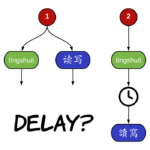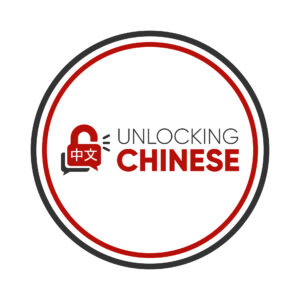 Taking responsibility for your own learning seems like an obvious thing to do. While not all students would claim that they do it, I think all would agree that being responsible is good. Yet it took me years to figure out what being responsible means and what the consequences can be if you’re not in charge of your own learning.
Taking responsibility for your own learning seems like an obvious thing to do. While not all students would claim that they do it, I think all would agree that being responsible is good. Yet it took me years to figure out what being responsible means and what the consequences can be if you’re not in charge of your own learning.
Tune in to the Hacking Chinese Podcast to listen to the related episode:
Available on Apple Podcasts, Google Podcast, Overcast, Spotify, YouTube and many other platforms!
I think the reason most students don’t take responsibility is that school has taught us not to. Most of our youth is spent within a system where success is defined by teachers and curricula. Following the teacher, textbook or syllabus is the best way, sometimes the only way, to succeed.
Naturally, school is not supposed to be like that; we’re not menat to learn natural and social sciences, maths and languages only to get good grades, but that’s what it feels like for most students. This means that most people who start learning Chinese as teenagers or young adults simply keep going and assume that if they do what the course requires them to do, everything will be fine.
It won’t be fine, though. One day, you’ll realise that your Chinese is not as good as it ought to be, or that you’ve missed many important things. There are plenty of people who have good grades, but can still hardly use the language.
Your grades don’t measure what actually counts
While going to school and learning Chinese might overlap, they are quite different for most people reading this article. School is about much more than just knowledge, and in practical terms, grades might actually be more important than knowledge. With knowledge, you get to understand the world, people and our societies, but with grades, you can get into the right university, and then finally find a high-paying job and join the world.
When learning Chinese, it’s easy to fall into the same mode of thinking, and most people do without even realising it. I certainly did, which is why I write this article.
Learning Chinese as an adult is nothing like learning maths or literature in school. For a a large majority of students, actual proficiency in the language is what counts, not the number or letter on some transcript. In fact, unless your Chinese reaches very advanced levels, the likelihood is that your grades are completely useless. You might need good grades to continue to more advanced courses or to apply for scholarships, but outside of the system itself, nobody cares.
Your learning, your responsibility: Reaping what you sow
So, the earlier you realise that you’re in charge the better. You’re learning Chinese for your own benefit, not to please the teacher or meet course requirements. Taking responsibility for your own learning is important whether you’re enrolled in a course, including if you’re still in school, or if you’re learning on your own. If you trust somebody else to take responsibility for you, you will regret it later!
The reason is quite simple: you have your own goals for learning Chinese, even if you might not have explicitly thought about them too much. These goals never overlap completely with the learning goals stated in a course syllabus, and this matter more than you think. Here are some concrete examples:
 Most universities have a strong bias towards the written language. While there will be oral exercises and the like, important exams are still written, not spoken. If you want to focus on the spoken language first, and most people probably should, you need to compensate for that on your own.
Most universities have a strong bias towards the written language. While there will be oral exercises and the like, important exams are still written, not spoken. If you want to focus on the spoken language first, and most people probably should, you need to compensate for that on your own. If your course insists on handwriting and maybe even requires you to be able to write all the words you learn by hand, you’ll end up spending a large majority of your study time on characters. This is almost certainly a mistake, unless handwriting is an important part of why you’re learning Chinese.
If your course insists on handwriting and maybe even requires you to be able to write all the words you learn by hand, you’ll end up spending a large majority of your study time on characters. This is almost certainly a mistake, unless handwriting is an important part of why you’re learning Chinese. Courses never contain enough support for pronunciation, which means you’re largely left on your own. If you’re very good at mimicking and picking up new sounds, this might work, but the result for most students is that they later realise that they should have spent more time with tones early on.
Courses never contain enough support for pronunciation, which means you’re largely left on your own. If you’re very good at mimicking and picking up new sounds, this might work, but the result for most students is that they later realise that they should have spent more time with tones early on.
I have personal experience of all these and I could list many, many more. Depending on where you learn Chinese, you can’t always rely on your teacher being competent either, but this is difficult to tell before you reach a more advanced level, and then it’s too late. Sometimes it’s small things that are being taught even though they are wrong, but sometimes it’s the general approach that just isn’t suitable for second language learners. I ranted about this when it comes to learning Chinese characters here: How to not teach Chinese characters to beginners: A 12-step approach
How to not teach Chinese characters to beginners: A 12-step approach
You’re the only one who really cares
Another important reason to take responsibility yourself is that it’s your Chinese we’re talking about. Your proficiency level matters more to you than to anybody else, so you should think twice before outsourcing responsibility to someone else.
While your teacher probably cares at least somewhat about your progress, teachers have dozens or hundreds of students at once, and can’t possibly cater to each and everyone’s needs. Teachers are also constrained by a curriculum, lack of time and resources, and sometimes competence.
Social and psychological factors also limit how much you can rely on teachers and courses. A good example of this is pronunciation, which is simply not a focus in most Chinese courses around the world. It’s possible to have a dozen teachers over several semesters and still not know that you have a basic problem with tones. I’ve observed the most egregious pronunciation errors go by without a comment, including students who have studied for a year and still pronounce shì as the English word “she”, or haven’t figured out that u after j, q and x is actually ü. As a beginner, this is fine, take it easy, but not even telling students about these problems is unforgivable in my opinion. If you want more basic misunderstandings of Pinyin that are often left to rot, I’ve collected the most important ones here: A guide to Pinyin traps and pitfalls: Learning Mandarin pronunciation
A guide to Pinyin traps and pitfalls: Learning Mandarin pronunciation
Like I said, this is not because teachers are mean or incompetent, it’s mostly a combination of the constraints I mentioned, along social and psychological factors. It’s uncomfortable to correct someone’s pronunciation, and some students make this much worse by becoming very angry or upset, as if helping them with their pronunciation is somehow a personal offense.
The best approach I’ve found for getting around this problem is to be clear what your own goals are and communicate that to people who are there to help you.
- If you hire a tutor, tell them what you want to practise. If they keep throwing fifty new words at you each lesson, even though you just want to develop your fluency, find another tutor.
- If you enroll in a course, compare the curriculum to your goals and talk with the teacher to determine if it’s the right course for you.
- If you have helpful native speakers around you, let them know that you actually enjoy being corrected on your pronunciation and would appreciate help (but don’t count on it, because they are your friends, not hired tutors).
Taking charge does not mean learning on your own
While it’s true that you’re responsible for your own learning whether you realise it or not, this doesn’t mean that teachers, courses and textbooks are useless. In fact, I think they are all essential for successful learning! But they are just resources, nothing more, nothing less. You should use them in light of where your Chinese is now and where you want it to be in the future. Plot the path yourself, but use whatever resources you have available to get there. Here’s some guidance for each:
- Training your Chinese teacher, part 1: Introduction
 – This is series of articles discussing how to get the most out of a teacher. This involves collaborating with the teacher and figuring out what works best for you, matching their competence and personality with your needs and preferences.
– This is series of articles discussing how to get the most out of a teacher. This involves collaborating with the teacher and figuring out what works best for you, matching their competence and personality with your needs and preferences. - Should you enrol in a Chinese course or are you better off learning on your own?
 This article explores advantages with enrolling in a course and compares them to the benefits of independent learning. These can be combined and whether or not you should enroll in a course depends on many factors, but the most common answer is “yes”.
This article explores advantages with enrolling in a course and compares them to the benefits of independent learning. These can be combined and whether or not you should enroll in a course depends on many factors, but the most common answer is “yes”.  Why you should use more than one Chinese textbook – In the online community of language learners, textbooks get their fair amount of criticism, and for good reason. That doesn’t mean that we should throw out the baby with the bathwater, though, because textbooks (especially in plural), can be very helpful if used correctly.
Why you should use more than one Chinese textbook – In the online community of language learners, textbooks get their fair amount of criticism, and for good reason. That doesn’t mean that we should throw out the baby with the bathwater, though, because textbooks (especially in plural), can be very helpful if used correctly.
Conclusion: Take control of your Chinese learning now
While there there are great teachers out there who, given unlimited time and resources, could guide you to such an extent that you don’t really need to take control yourself, they are exceptionally rare. And how would you tell if you’ve found one? As a beginner or intermediate learner, you’ll only know how good a certain teacher is in hindsight. Finding someone who can help you with specific aspects of learning Chinese, such as speaking practice, essay writing and the like, is not too hard, but finding someone you can trust with the bigger picture is not realistic.
Better then to stay active yourself. Explore options and discuss your learning with fellow learners and teachers, read what other people have to say (you’re doing that right now!). Don’t trust others to make important decisions for you; learn enough to make them on your own.
This means that the biggest mistake you can make is to enroll in a course, lean back and think that you’ll learn Chinese if you do what you’re told. You probably won’t, and sooner or later, you’ll realise that you’ve wasted a lot of time and energy. Of course, taking responsibility and being in charge also takes time and energy, but at least you can make sure you end up where you want to be.
If you want more structured advice from me, I offer two courses that might be of interest:
 Unlocking Chinese: The Ultimate Guide for Beginners – This course will kickstart your learning, teaching you the basics of speaking, listening, writing and reading, along with key strategies for how to learn characters, tones and much more. It’s perfect for people who just started out or have been studying for a while but struggle to find a way forward! Intermediate and advanced learners should check out the next course, though.
Unlocking Chinese: The Ultimate Guide for Beginners – This course will kickstart your learning, teaching you the basics of speaking, listening, writing and reading, along with key strategies for how to learn characters, tones and much more. It’s perfect for people who just started out or have been studying for a while but struggle to find a way forward! Intermediate and advanced learners should check out the next course, though. Hacking Chinese: A Practical Guide to Learning Mandarin – This course upgrades the way you learn Mandarin and is aimed at learners of all levels. It covers all aspects of learning Chinese, but focuses exclusively on how to learn. Perfect for those who have been learning for some time and feel they are stuck or don’t know what they’re doing wrong. If you’re a beginner, you should get Unlocking Chinese first!
Hacking Chinese: A Practical Guide to Learning Mandarin – This course upgrades the way you learn Mandarin and is aimed at learners of all levels. It covers all aspects of learning Chinese, but focuses exclusively on how to learn. Perfect for those who have been learning for some time and feel they are stuck or don’t know what they’re doing wrong. If you’re a beginner, you should get Unlocking Chinese first!
Editor’s note: This article, originally published in 2011, was rewritten from scratch and massively updated in August, 2022.

25 comments
Good reminder! I think that someone’s own motivation and hard work is the key to master Chinese. If someone studies only for their teachers and to get good grades, then what happens when you stop having classes?
Unfortunately my self-discipline isn’t too great, but I still understand that if I’m not improving fast enough, there’s only one to blame, me.
I was analysing my past blog posts yesterday and realised that this is the exact premise that I’ve written my whole blog on. As a language learner, you need to be responsible for your own learning – and the blog (just as Hacking Chinese) then gives resources and ideas that can help with the learning process.
But just like in your case, I myself took years to figure out that it’s really not about pleasing the teacher or reaching learning goals that are set in some book or curriculum and that I needed to set my own goals, look for ways to attain them, track my progress, and keep trying new ways to learn.
As often, I’d like to see it broader than just learning Chinese (or another language) and see it as a change in mindset. Schools are slowly transforming themselves to this setup where they become a resource for students who are supposed to guide their own learning.
But I doubt enough effort is being spent in hammering this message home: “you are responsible for your own learning”.
I agree with you, this is a problem which goes far beyond language learning. Even though I don’t write much about my personal life here, I think you can guess that I have embraced this attitude for everything I do. I feel that that is something which sets me apart from most other people I’ve met. Now, I don’t say that to show how cool I am, I do that because I think such a shift in attitude is possible to achieve for most people. I wasn’t born like that, the insight evolved over many, many years. Of course, writing a blog post such as this one won’t be enough, but I hope it can be a start.
I took Chinese for two years in high school, and during all that time, a girl in my class pronounced pinyin syllable “shi” as “shee”. Not once did the teacher correct her. I think this is a big problem with language classes. I’ve had a lot of them during my school years, and so many teachers just don’t say anything when their students make serious mistakes.
Yes, I agree, but to be fair, pronunciation is only one aspect of Chinese and some teachers are required to teach many things (go through a certain amount of chapters, teach a certain number of words), but very few of these official requirements deal with pronunciation. So it’s partly a teacher problem, but it’s also a curricular problem. Still, taking responsibility yourself solves both problems!
This article is trying to tell you that if don’t take into consent that your Chinese could be better by constantly practicing pronounciation. It tells you an example of teacher that once had these problems with mispronounciation Chinese words. The teacher told ways you can improve your learning of the language, she said that she would speak Chinese to her experienced friends.
我认为这是一个令人着迷的文章,它告诉我很多关于我如何提高我的中国语文. 我学到了很多新的方法来提高学习中国,比如说话更有经验的朋友. 这个例子被这个老师谁曾经是念错的话,她会说示,于是她开始参加她的朋友和随着时间的推移她的朋友们会纠正她
Great article! I think you are right, it is a correct attitude no to always blame others. And I totally agree when you mention we should be responsible for our life but there is still a serious problem with this. Because if we are talking about random strangers met on the street or in a Starbucks, of course they won’t even think about correcting anyone but when we are talking of (real) teachers (not tutors in language centers) they are still supposed to be qualified and moreover paid for doing the job.
Anyway this is often the case with some local teachers who don’t want students to loose face…Another cultural specificity 🙂